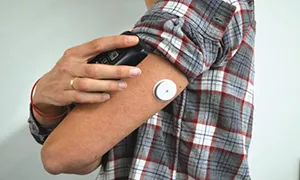
Our Diabetes Research Steering Groups, involving people with diabetes, researchers and healthcare professionals, have written a new paper. It sets out clear recommendations for future research to help more people with diabetes access and use technologies that can improve their wellbeing and health.
Technology plays a key role in diabetes care. In the 1980s, the introduction of insulin pens and handheld digital blood glucose meters allowed people living with diabetes to manage their blood sugars more easily. In recent years, insulin pumps and continuous glucose monitoring (CGM) technology have helped people reduce the risk of hypos and spend more time in the target blood sugar range. And today, these technologies are being combined, known as ‘hybrid closed loops’ or the ‘artificial pancreas’, allowing people to fine-tune their diabetes control. This reduces some of the burden of constant checks and monitoring.
Innovations in diabetes technologies are helping people live better with their diabetes, but we know that not everyone is benefiting equally. More needs to be done to make sure technological developments are meeting the needs of all people living with diabetes. That’s why in December 2019, members of the Diabetes Research Steering Groups (DRSGs) and external experts were invited to a workshop to discuss and agree recommendations for future research into diabetes technology.
The group made five main recommendations:
- Develop new, faster ways to work out which devices have the biggest impact on people’s health and wellbeing, to match the pace of technology developments so that new devices are available to people with diabetes quicker.
- Identify the best ways to give people the training they need to use diabetes technologies effectively.
- Understanding how people’s ethnicity, gender, age and other health conditions might influence how they use technologies and find new ways to overcome any barriers to technology use.
- Learn more about the effect of using diabetes technologies on mental health and wellbeing, both positive and negative.
- Increase in use of time spent in a healthy blood sugar range as a measurement of diabetes tech success in research trials.
By encouraging more research in these areas, we hope that more people living with diabetes will be able to access and effectively use technologies to keep blood sugar levels in target range and life better and more confident lives.
For a deeper dive into the group’s priorities and recommendations, the full paper is available in Diabetic Medicine.
Tom Wylie is Research Manager for the DRSGs. He said:
“It’s vital that we make sure that diabetes technologies are designed in a way that supports as many people as possible to manage their diabetes. We’re really excited to see how researchers and research funders will use these recommendations from people living with the condition to shape research that will inform how technologies are used in diabetes care.”
